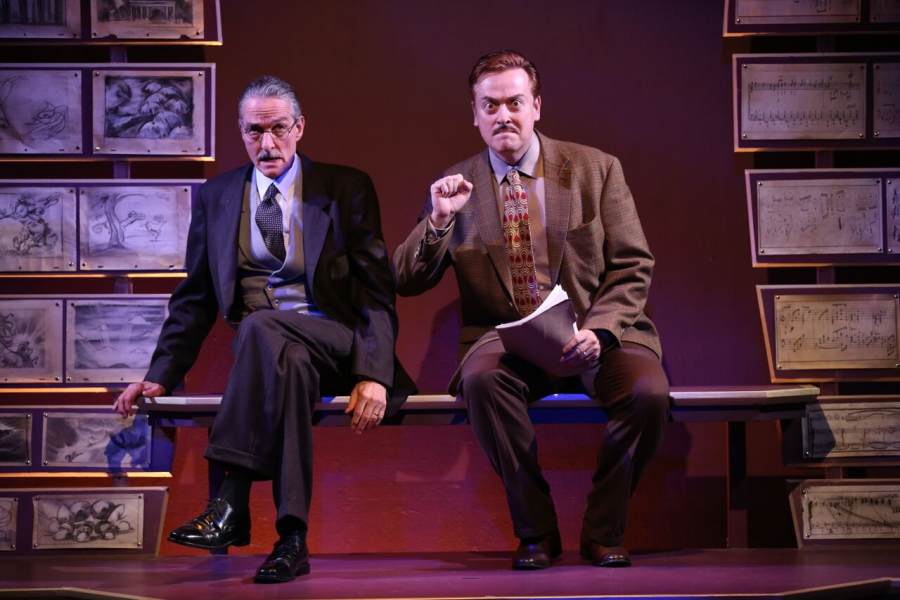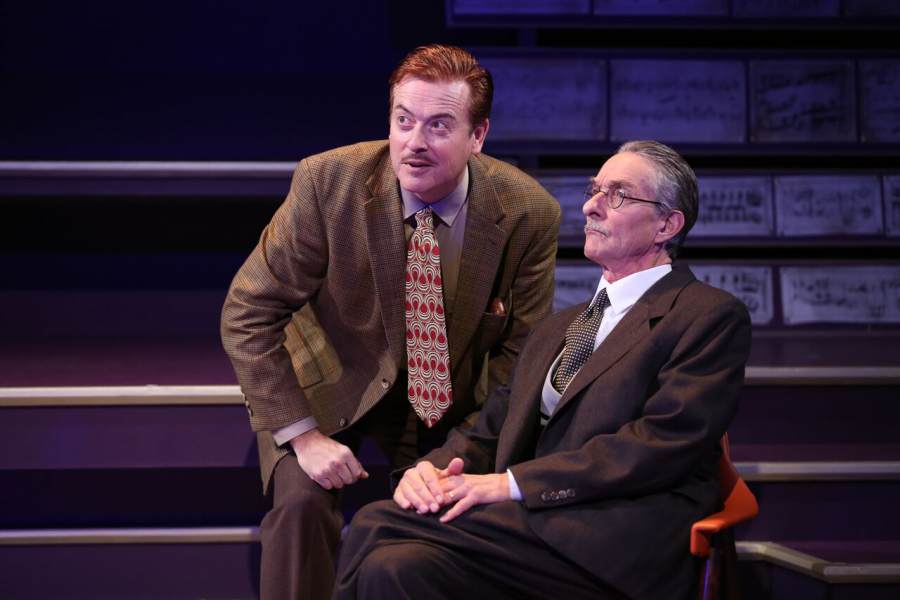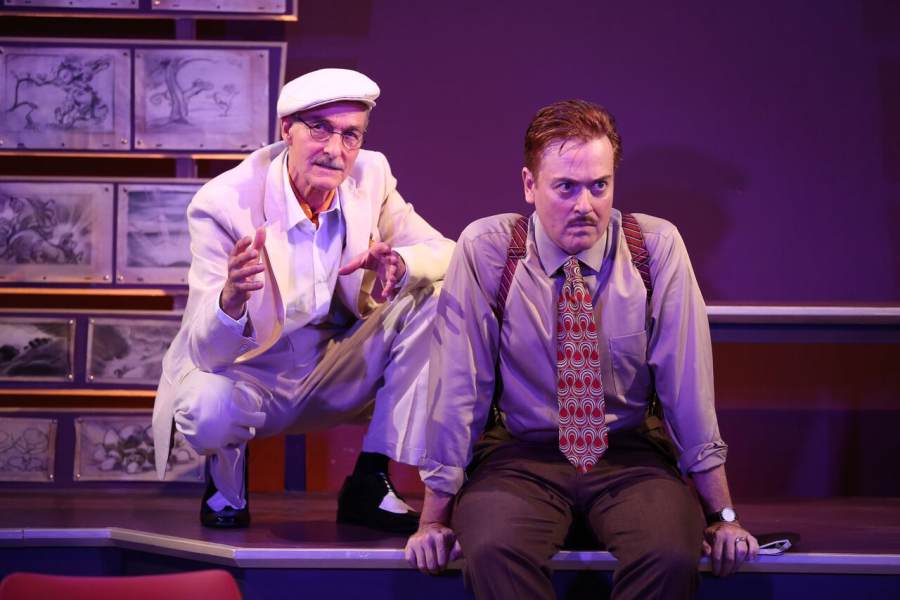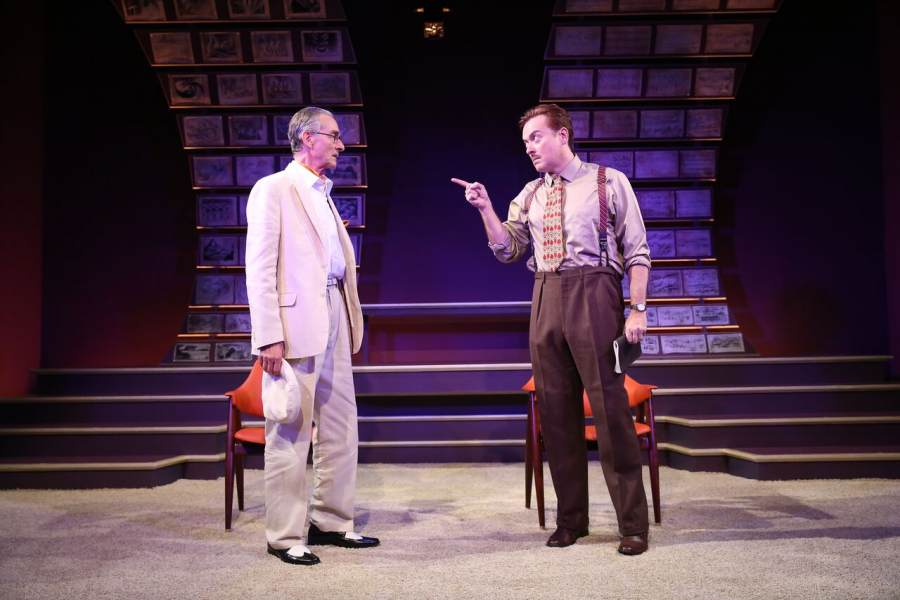

It’s a guarantee you will learn something new when talking with actor Mark Shanahan, currently playing Walt Disney in Frederick Stroppel’s play Small World: a fantasia at 59E59 Theaters. A scintillating conversationalist, Mr. Shanahan’s fertile mind effortlessly segues from Hollywood to world history to Orson Welles, making me wish we had more than a half an hour to chat. With warmth, humor and passion, he speaks about playing the iconic historical figure of Walt Disney, the tenacity of the theater in our digital age and a career where he juggles being an actor, a director and a playwright.
What steps did you take as an actor to play the role of Walt Disney, a person that practically everyone in world knows?
Well, yeah, that’s true. It’s Uncle Walt, he’s everyone’s Uncle Walt. He’s left this beautiful legacy that’s part of our, if not collective consciousness, our commercial culture, right? Disney still has its hands in every facet of our lives.
I read a couple of Disney biographies and then of course YouTube is filled with clips of him hosting the Wonderful World of Disney or introductions to Disneyland as a theme park, so there is plenty to see of his public persona which was very avuncular, very jovial, very kindhearted. One wonders what the private Disney was like. I watched the recent PBS documentary about him which was really excellent I thought. You can see what a complicated guy he was – in his politics, in the way his employees felt about him, some were very loyal and loved him and some thought he was fearsome. You have to remember he was a titan and a genius. A genius in a different time.
Fred’s [Frederick Stroppel, playwright] written this very beautiful story that imagines the meeting between Disney and Stravinsky. Fred takes into account his public personality; you get a certain sense of who he was by how he presented himself. And then we get to make something entirely different, an imagined version of this private man, behind closed doors. Meeting with Stravinsky, how he might at that moment sell the idea of Fantasia to Stravinsky.
Then after all the research, you have to put it off to the side and see what seeps into you, stays with you. I mean I noticed how he uses his hands in the videos; he was a builder of dreams as an animator, he had others doing the work, but he did the early sketches. I thought his hands might be really interesting and important. And of course you put on a mustache and comb your hair and then feel like Disney. (Laughs)
A smooth segue to my next question, Mark! I take it you wear a mustache?
Oh yeah. My own personal mustache needs a little help to make it read from stage.
The other character in Small World: a fantasia is the great classical music composer Igor Stravinsky.
Right. Stravinsky is played by Stephen D’Ambrose, an incredible acting partner. He’s so fearless and committed, a gentleman and I have the best seat in the house every night, getting to act across from him!

In the film Fantasia, Walt Disney uses Stravinsky’s infamous ballet music Rite of Spring for the segment on the creation of the world and the prehistoric world. How much of the story is based upon the actual history of their meeting?
We know that they met. It’s 1939 and Fantasia is this passion project for Disney. Have you ever seen Fantasia?
Oh, yes. Several times.
Of course, as a classical musician and a fan of music you would have. It really is far out there. After doing really incredible things with Snow White and a lot of the shorts he was making, people thought of him as a genius, but he was just grabbing on to what animation can do and Fantasia was a real risk for him. He constantly took risks financially on these things and it didn’t necessarily work out. I mean later on people recognized the value in it, but at the moment it gave him a lot of trouble. So we, in our play, fantasize to some extent on how much he wanted Stravinsky’s blessing for the film. Stravinsky made this beautiful ballet that had something to do with pagan sacrifice and Russian history that’s deep in his bones, and Disney turns it into dinosaurs? And cartoons? You can imagine these two brilliant men, geniuses though they were, meeting and trying to collaborate! They came from two different worlds and cultures at a moment in history which was bloody and brutal. They saw the world in different ways and the idea of them collaborating is the stuff of the play, where the conflict comes in.
So would you say you are using the actual historical meeting as a jumping off place?
Absolutely. That’s what Fred’s really wonderful conceit is. We don’t know what was said at that meeting; there are pictures of them. Stravinsky doesn’t look particular happy in the pictures. But later on we know that to the press Stravinsky called it [Fantasia] "an imbecility" and "foolish" and thought it was horrible.
And Stravinsky was the only living composer whose music was used.
You’re right. Disney used Beethoven, Tchaikovsky, Schubert, Mussorgsky and Bach’s music. There’s a joke in the play. Stravinsky says: "If you wanted Creation music you should have called Haydn. Since he’s dead he’d be far less likely to be offended." [Haydn wrote an oratorio called The Creation in 1798.] I think that Disney wanted the approval of Stravinsky to give validity to this outlandish project.
You know Disney met with Orson Welles around 1944 and Welles wanted to make The Little Prince, some of it animation and some of it live action. That meant that at that moment [in time] he’d have to go to Disney for the animation. And they apparently had this terrible meeting. Disney stormed out saying, “There’s only room on this picture for one genius.” That line sticks with me, even though it is about Disney trying to collaborate with a different genius. The two men in Small World, both of them rightly changed the world telling stories, finding their audience and cultivating the way the world was seen through their art but I think sometimes people can’t collaborate.

What a great conflict for a play; there’s only room for one genius!
We did this play two years ago at Penguin Repertory Theater and it didn’t seem to have the same impact. Right now everyone seems so divided and we don’t see the other person’s side. How can we possibly come together when we see the world so differently? Isn’t there validity in someone else’s point of view? And in trying to find common ground? The play right now kind of hits home in a very different way, which is beautiful. And you can’t plan those things.
You also are a director.
And a playwright. I recently adapted a Feydeau farce, The Dingdong, done here in New York with the Pearl Theater and now being done around the country.
You and the director of Small World, Joe Brancato, have a long history of working together. Can you speak a bit about the process of working as an actor with Mr. Brancato? Is it hard to take off your director’s hat?
I feel like I do all these different things and they do require different skill sets, but at the heart you are always asking the same question: “What story do I want to tell and how do I do it?” So you have to put on different hats at different times and figure that out. There’s an old saying, “You don’t ask a fish what it’s like to be wet.” So when I’m acting, I really have no problem taking off the director’s hat. It’s a way of saying, “Thank God it’s Joe’s problem.” And Joe and I have a short-hand because we’ve known each other for so many years. It’s great to say to Joe in working on Small World, “Tell me how to handle my corner of the play, help me figure this out.” And when I go back to directing next month, I’ll put on the director’s hat. But you are always after the same thing, trying to tell the story in the best way. Also working with Fred, it’s great to know the author is willing to make changes as we get deeper and grow with the play.
What do you desire for the audience to take away from seeing Small World: a fantasia?
They come and they see two people that I think they’ve heard of and perhaps they think they know. And when you’re in the presence of two big personalities you try and see them as human beings, what their gifts are – they’re fallible, they’re wonderful, they’re horrible, they’re all those things, as we all are. But to see these two titans clash, like the dinosaurs in Fantasia is hopefully thrilling. It also allows you to see them struggle with themselves and each other. And that gives a little food for thought. Fred’s very funny, he writes comedy very well but the play is also oddly moving….which no one expects. The subtitle is "a fantasia." Small World: a fantasia. And there’s a lot of fantasy and places we go that are unexpected. I think we get to take people on a very strange ride, like in an amusement park. (Laughs) Once we started paying attention to the subtitle we were like, you know what, we don’t have to be very literal or realistic about a lot of things. We can go on a little strange dreamlike journey.

Warning, here’s a big global question, but I’m asking it because you are a seasoned theater artist who not only works in New York but also has several regional theater “homes” and your career reflects a deep commitment to the theater! Why do you think we need the theater? Is the theater dying?
I don’t know what it needs or what it should be, but working in the theater starts to ask you to reveal who you are. And to figure out what stories need to be told. I don’t know if I have a witty answer for you, but when you say is the theater dying, everyone’s been hearing that phrase, people have been saying that since the Greeks. “Uh, we have something else to do.” But it never dies. Look at New York. I grew up here. Theaters have closed, rehearsal spaces have closed, stages that I’ve worked at are gone, but guess what? Like weeds, the theater just invades…another theater pops up, another space opens. And people still come to this city saying “I’m going to tell stories. I’m going to make you come see them.” And we all come see them. And in this weird day and age I actually think the theater feels more valuable than ever before and more appreciated in some ways because of this. (He holds up his cell phone.) Because everyone is looking at a screen in their palm and we’re connected through email and texting and Facebook but we’re also feeling very disconnected. And it’s a very different world that my kid’s growing up in because of this. (He holds up his cell phone again.)
But when you go to the theater, you have to be there. It’s to me the last non downloadable experience. You have to go to the theater to experience going to the theater. You can’t watch a recording of it. You can’t Skype in. It’s about sitting next to other strangers who also woke up that morning and decided to create an audience with you and you didn’t know that you were going to do that together. And you go and you sit there and you watch this story in the present tense together. And I feel people are relieved to put their phones away. Relieved to sit with other people. Relieved to come together and feel like they did something together. And when you hear people laugh or gasp together. It’s not just, “Oh they all laughed 'cause that was funny.” But also a feeling that “We did this together tonight.” And that’s getting harder and harder to experience in this world. Don’t you think?
Oh yes.
So storytelling or coming together to hear music feels communal. Which we are all thirsty for. I feel like I should have a professorial answer to your question, but the truth of the matter is I just love making plays. And I love going to plays. I love it. As much as you’d like to come up with a great answer about the importance of the theater, it just is. Theater is never going away. And some people are tapped on the shoulder at some point in their lives and told “come over here and make plays” and if you’re lucky enough to have that tap I figure, “All right, I’ll join that party!” And it’s been a good party!
Speaking of parties, if you could have a dinner party and invite a theater great who has passed on, who would you invite and what would you talk about with them?
Orson Welles! Want to ask him about how to be an actor and a director at the same time. What did it do to him to have projects ripped away. And then finally ask him, “Don’t you have somewhere that copy of The Magnificent Ambersons with your own cuts? Underneath a couch? Please can’t you show it to us?” That’s my dream. Because you know it’s going to show up in Rio somewhere or in an attic someday. I just hope I’m alive when that happens!
And the obvious one. Sit down with Shakespeare and talk about the First Folio and what he wrote and what he didn’t, dispel all the myths…that would be the greatest interview of your life.
What’s next on the horizon for you after Small World ?
I return to directing next. I just finished directing 39 Steps at the Alley Theater in Houston, which was sadly interrupted by Hurricane Harvey. And though it ended prematurely, it was a glorious production. But I return to the Alley to direct a new Jeffrey Hatcher play called Holmes and Watson. Head off to Virginia Stage to direct Hound of the Baskervilles. And at Florida Rep I’m directing an Alan Ayckbourn farce, How the Other Half Loves…just this morning we had our first design meeting for that. So it’s mostly directing, although next month I’m acting in one of David Stoller’s fantastic Shaw readings at Symphony Space in late October. And one more acting thing, reading aloud the Harry Potter books to my daughter!